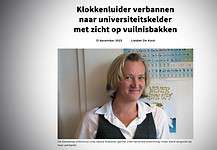On hiring faculty off the tenure track: That’s part of the business model. It’s the same as hiring temps in industry or what they call “associates” at Wal-Mart, employees that aren’t owed benefits. It’s a part of a corporate business model designed to reduce labor costs and to increase labor servility. When universities become corporatized, as has been happening quite systematically over the last generation as part of the general neoliberal assault on the population, their business model means that what matters is the bottom line.
That’s one aspect, but there are other aspects which are also quite familiar from private industry, namely a large increase in layers of administration and bureaucracy. If you have to control people, you have to have an administrative force that does it. So in US industry even more than elsewhere, there’s layer after layer of management—a kind of economic waste, but useful for control and domination. And the same is true in universities.
This includes professional administrators like deans, for example, who used to be faculty members who took off for a couple of years to serve in an administrative capacity and then go back to the faculty; now they’re mostly professionals, who then have to hire sub-deans, and secretaries, and so on and so forth, a whole proliferation of structure that goes along with administrators.
“Flexibility” is a term that’s very familiar to workers in industry. Part of what’s called “labor reform” is to make labor more “flexible,” make it easier to hire and fire people. That’s, again, a way to ensure maximization of profit and control. “Flexibility” is supposed to be a good thing, like “greater worker insecurity.” Putting aside industry where the same is true, in universities there’s no justification….There are all sorts of ways of adjusting for that variation. The idea that labor should meet the conditions of “flexibility” is just another standard technique of control and domination. Why not say that administrators should be thrown out if there’s nothing for them to do that semester, or trustees—what do they have to be there for? The situation is the same with top management in industry: if labor has to be flexible, how about management?
Sicer ima Chomsky v mislih predvsem ZDA, a mislim da tudi Slovenija ni imuna na nekatere od trendov, ki jih omenja. Najbolj očitno seveda enoletne zaposlitve mladih podoktorjev. Pa tudi glede birokracije. Na FMF, ki je edini primer, ki ga bolje poznam, se je npr. število administrativnega osebja vsekakor znatno povečalo v zadnjem desetletju in pol. In prepričan sem, da imajo vsi zaposleni tam polne roke dela, ter je to povečanje posledica zunanjih pritiskov po povečani “papirologiji”, in ne želja fizikov, da bi imeli večjo administracijo… Prav tako bi lahko govorili o sloju profesionalnih akademskih menedzerjev tudi v Sloveniji, le da tu namesto po različnih univerzah, navadno krožijo med politiko in univerzami. Le plače niso tako pretirane kot v ZDA.
















"Why not say that administrators should be thrown out if there’s nothing for them to do that semester,"
Tule mi takoj pade na pamet primer komercialista na velikem slovenskem raziskovalnem inštitutu, ki je do stropa zafural uvedbo poslovnega sistema in so ga lahko s položaja odstranili le tako, da so ga povišali v pomočnika direktorja.
Pa še primer na FE v razmislek: tu smo vsi raziskovalci (okoli 170!, visokošolskih učiteljev je okoli 130) zaposleni na pogodbah za določen čas. Podpisujemo jih za nekaj mesecev ali nekaj let, nekateri že v obdobju skoraj 30-ih let! Za povrh vsega nam naš pravilnik ne dovoljuje, da bi bili člani katerega koli telesa upravljanja (niti v Komisiji za znanstveno raziskovalno področje znotraj Senata). Pa se vendar to našim nadrejenim ne zdi sporno ali dovolj pomembno, da bi kakorkoli ukrepali, sprememba pravilnika ali statuta univerze ta hip ne pride v poštev! Urša